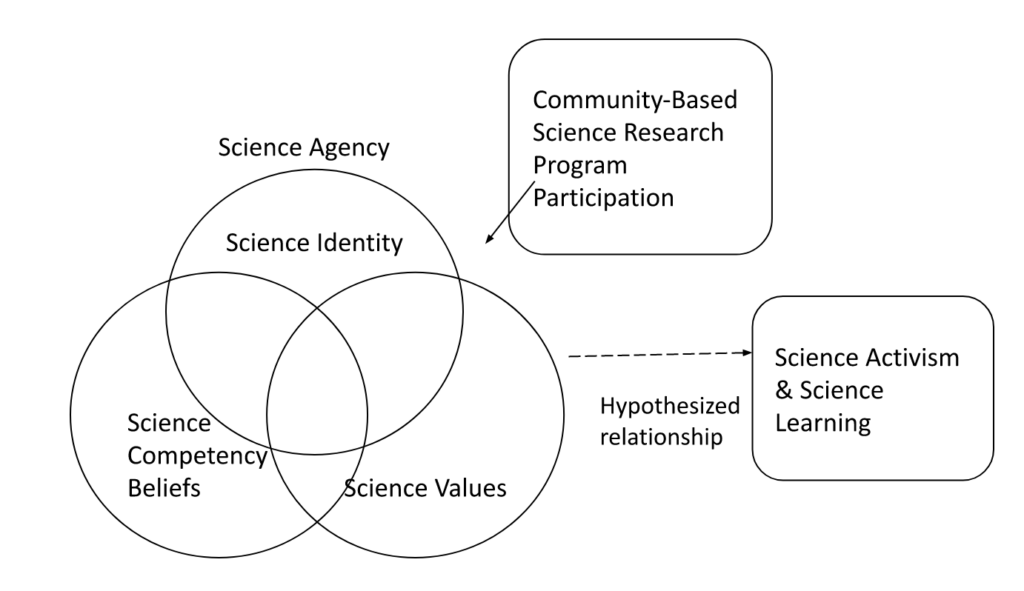Learn more about two of our current projects:
Energy Interns Program: Pathways to STEM Careers
Program Theory of Action
Implementation of the program is supported by a theory of action that conceptualizes engagement in community-based science research as contributing to participants’ ‘Science Agency,’ which we define as a combination of constructs that include Science Identity (i.e., sense of themselves as science thinkers), Science Competency (i.e., belief of themselves as competent science practitioners), and Science Value (i.e., awareness of the potential benefits of applying scientific practices to addressing critical community health and environmental issues). This theory of action is grounded in an undergirding hypothesis which holds that engagement in community-driven science research-focused experiences results in valued educational and developmental outcomes that better position urban youth to more effectively engage in STEM-related educational, occupational, and civic activities.

Program Impact Assessment
EBAYS also includes a Learning Science research component, wherein the educational and developmental impact of its activities are investigated using a mix of qualitative and quantitative data collection methodologies. As such, throughout its operation numerous EBAYS-related studies have been implemented that have utilized well-tested survey and interview tools in an effort to ascertain a clearer understanding of the ways in which EBAYS activities impact participating youth. Most recently, the following suite of assessment/evaluation instruments has been used to assess impacts:
- Post-retro-pre surveys to measure the components of student agency using the following previously developed measurement scales:
Science Identity Scale (Vincent-Ruz & Schunn, 2018), which asks youth to rate how well the statement “I am a science person” describes the way they think of themselves.
Science Values Scale (Lemke, 2001; Eccles & Wigfield, 2002; Azevedo, 2011)This scale measures how a youth understands various interactions of self with science knowledge and skills and places value on those interactions within their social context.
Competency Belief Scale (Vincent-Ruz & Schunn, 2018), which assesses youth’ perceptions of their abilities to do well in scientific activities.
- Surveys to address demographic questions related to gender and race/ethnicity.
- Semi-structured interviews aimed at collecting background information and youth reflections on relevant and impactful program experiences, as well as their reflections on the broader meaning and implications of their experiences in the program.
- Collection of youth-produced journal entries and written responses to prompts that ask them to reflect on similar themes and constructs as the original interview questions. Collection of these artifacts provides responses from all youth participating on a given day.
Program Impact Results
Recent results derived from a study that included over 400 middle and high school student participants indicate that exposure to EBAYS programming generates statistically significant increases in youth Science Agency, which is defined as how an individual identifies with, values, and feels confident engaging in science. These increases have been observed to occur regardless of gender, racial/ethnic background, or school level. Additionally, co-variant analysis of survey and interview data indicates that each of the components of Science Agency overlap and intersect with activism-related themes that emerged from analysis of interview and written response data, suggesting that there are several as yet-to-be specified ways in which youth’s burgeoning orientations toward activism occur.
During interviews, youth expressed the importance of science as a tool useful for increasing awareness of and addressing environmental health issues in the context of their lives and communities.
“I think that it is important to learn science because well it’s, there are a lot of things that one doesn’t know and that can sometimes affect us and to know them would be good because one would know well at least how to prevent things or something like that…
“You can probably present [the data] to a person in power. So, for example, like the mayor. And then if she is willing to work with you and like actually implement some type of change, then that would be useful…”

